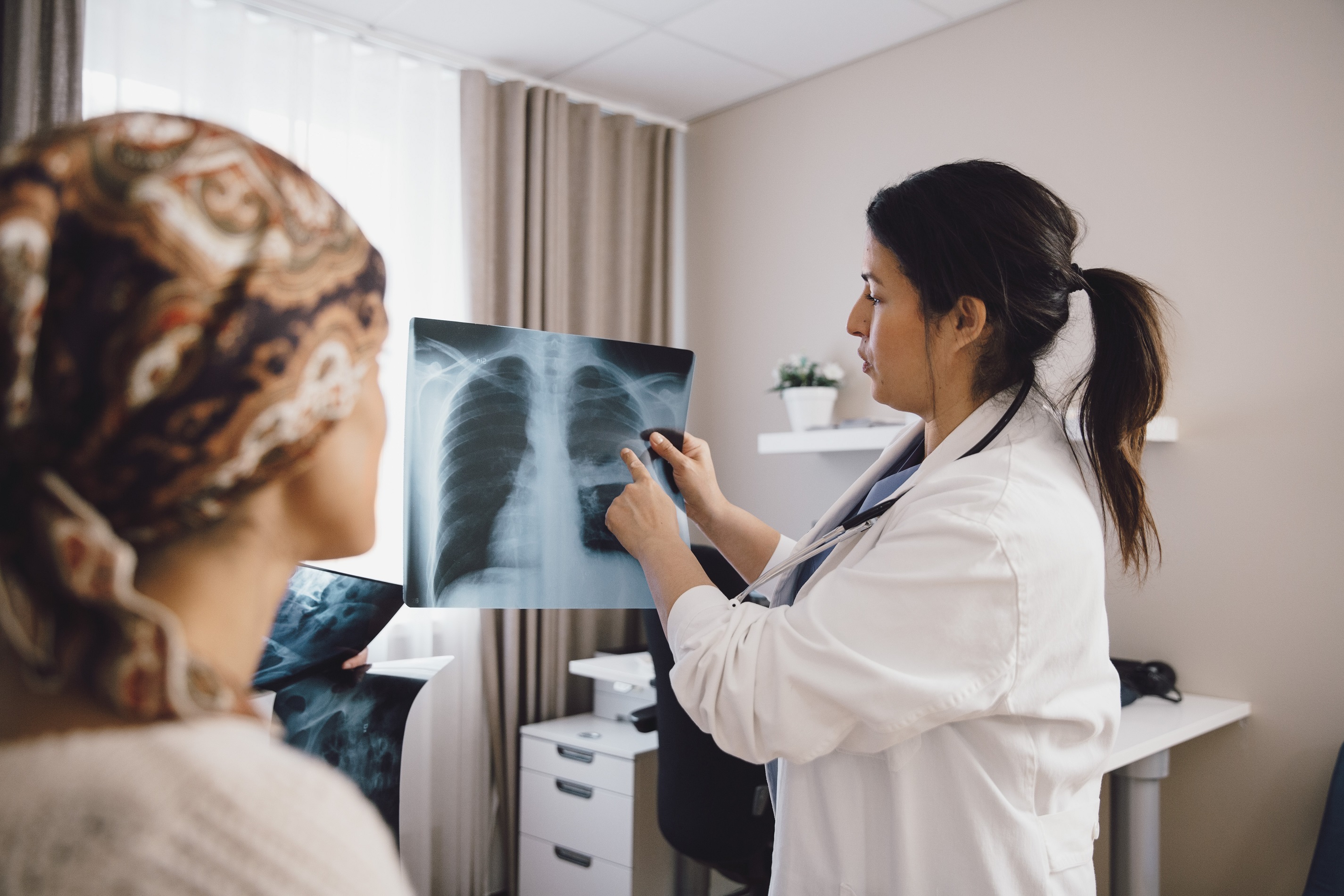What Is Metastatic Hormone Receptor-Positive Breast Cancer?
8 min read

Author: Mabel Mardones, MD
If you have breast cancer, your medical oncologist and the other members of your care team will use essential information to help gauge your prognosis and determine the most appropriate treatment. One of these data points is whether the cancer is confined to the breast or has spread to another part of the body. Breast cancer that has moved beyond its point of origin is called metastatic breast cancer or distant breast cancer.
Another important piece of information is whether the cancer depends on hormones – estrogen and/or progesterone – to grow. If it does, it’s known as hormone receptor-positive breast cancer. Around 70% of breast cancers are hormone receptor-positive, according to the American Cancer Society. Metastatic hormone receptor-positive breast cancer is breast cancer that grows with the help of one or both of the female hormones and affects an area of the body beyond the breast.
Read more about the hormone status of breast cancer and how it impacts treatment options.
Currently, metastatic breast cancer, including hormone receptor-positive disease, has no definitive cure. However, modern medicine continues to improve, and patients are living longer with each advancement in available therapies. Cancer specialists use hormone therapy and other treatments to reduce symptoms and help patients enjoy the best quality of life possible.
Breast Cancer Hormone Receptor Status Explained
All breast cells – and some breast cancer cells – have proteins called estrogen or progesterone receptors. These receptors bond with their namesake hormones in the blood because they help the cells grow.
Breast cancer is hormone receptor-positive if it has estrogen and/or progesterone receptors, and it’s further classified based on which type of receptor it has. The cancer is ER-positive if it has estrogen receptors and PR-positive if it has progesterone receptors.
Some breast cancers are hormone receptor-negative, meaning they don’t have hormone receptors. Still, other breast cancers may be triple-negative – they don’t have hormone receptors and aren’t affected by HER2, a protein that helps breast cancer grow and spread quickly.
Learn more about triple-negative breast cancer.
Your cancer team will use a sample of the tumor to test for hormone receptors following a biopsy or surgery to remove the cancer. If you have hormone receptor-positive breast cancer, you have a treatment option available to you that patients with hormone receptor-negative disease don’t – hormone therapy.
When Breast Cancer Spreads
Breast cancer can spread to other parts of the body through blood or lymph, which is the fluid of the lymphatic system. Common sites of spread, or metastasis, include the bones, brain, liver, and lungs, according to the American Society of Clinical Oncology (ASCO).
Breast cancer can be metastatic when first diagnosed. In most cases, however, it spreads later, after treatment for non-metastatic disease, and the reason is unclear. The cancer’s stage, speed of growth, and hormone receptor status influence whether it spreads, ASCO reports.
Certain factors can increase your risk of developing breast cancer, regardless of whether it’s metastatic or non-metastatic. These risk factors include:
Being older than 50
- Drinking alcohol
- Excess weight after menopause
- Family history of breast cancer or
- Getting pregnant for the first time after 30
- Having had breast cancer or ovarian cancer
- Hormone replacement therapy, which is different from hormone therapy for cancer, to treat post-menopause symptoms
- Inherited genetic changes, such as mutations in the BRCA1 or BRCA2 genes
- Low levels of physical activity
- Reaching menopause after 55
- Starting menstruation before 11
How to Manage Risk for Breast Cancer
Symptoms of Metastatic Breast Cancer
You may know that a lump in the breast is the most common symptom of breast cancer. If you have already been through breast cancer treatment and you notice a lump you should talk to your oncologist as soon as possible to have it checked out.
Other symptoms of breast cancer include breast swelling, breast or nipple pain, red or flaking skin on the breast, abnormal nipple discharge, and swollen lymph nodes under the arms or close to the collarbone.
Lymph node swelling may be a sign that breast cancer is no longer confined to the breast. Metastatic breast cancer can cause a variety of symptoms, including fatigue, nausea, vomiting, poor appetite, and weight loss. Other symptoms of metastatic breast cancer are specific to the site(s) that the disease affects, according to ASCO.
- If breast cancer spreads to the bones, it can cause pain in the joints, neck, or back. You may also have a higher risk of fractures.
- Breast cancer that moves to the brain can lead to headaches, nausea, dizziness, and vision problems, among other symptoms.
- If breast cancer affects the liver, you may experience jaundice – yellowing of the skin – itchy skin, abdominal swelling, and nausea.
- Metastatic breast cancer in the lungs can cause respiratory symptoms, such as shortness of breath, difficulty breathing, and a persistent cough.

Treating Metastatic Hormone Receptor-Positive Breast Cancer
Typically, cancer specialists use medications that travel through the blood, a type of treatment known as systemic therapy, to treat metastatic breast cancer. In some cases, treatment may also involve surgery and/or radiation therapy.
Systemic therapy options include chemotherapy, targeted therapy, immunotherapy, and, for metastatic breast cancer that is hormone receptor-positive, hormone therapy. You may receive one type of systemic therapy at a time or multiple treatments at once.
Breast Cancer Hormone Therapy
Hormone therapy plays a significant role in treatment for people with metastatic hormone receptor-positive breast cancer. On the other hand, it’s not effective for hormone receptor-negative cancers. According to the National Cancer Institute, the goal of hormone therapy is to slow or halt cancer’s growth by disrupting its fuel – estrogen and/or progesterone. Different types of medication accomplish this in different ways.
- Aromatase inhibitors disrupt the aromatase enzyme, which contributes to estrogen production.
- Ovarian suppression therapy uses medications or removal of the ovaries to reduce estrogen production. Sometimes, an ovarian suppression medication may be taken with an aromatase inhibitor.
- Selective estrogen receptor downregulators (SERDs) prevent estrogen-to-receptor attachment. One of the most common SERDs is fulvestrant.
- Selective estrogen receptor modulators (SERMs) attach to estrogen receptors and block the hormone from joining with the receptor. Tamoxifen is a common SERM.
Like many patients with metastatic hormone receptor-positive breast cancer, you may receive hormone therapy and targeted therapy in tandem. If that proves ineffective, chemotherapy may be necessary.
Breast Cancer Targeted Therapy
If you need hormone therapy, the type that you receive and other aspects of treatment will depend on a variety of factors, including whether you’ve reached menopause. Your cancer specialists will find the treatment that can best reduce the burden of cancer on your life.
Watch Rocky Mountain Cancer Centers' medical oncologist Dr. Mabel Mardones discuss metastatic hormone receptor-positive breast cancer.
49:1
Updated December 2023

